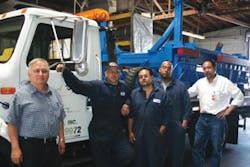Abe Padilla will tell it to you straight. A self-professed “respected old schooler,” he’s seen the changes in the industry and is eager to tell you about them.
His office at the shop outside Oakland International Airport is decorated with items he’s been given by people he’s met over his time in the industry. The walls of the reception area are lined with letters of appreciation, recommendation and pictures that he’s accrued over the years. Each one has a story to tell, and tell that story he will.
Abe Padilla, as president of A.P. Enterprise, a GSE maintenance company serving the western region of the United States, divides his time between shops. He ensures things are as they should be — calls promptly answered, the shop and all its parts neatly in place. And, of course, that equipment service is turned around with quality care in quality time.
“The expectation and our goal is as soon as the vehicle comes in, it goes out that night even if we have to stay later — no matter what,” he says.
It’s a strong work ethic that Abe says is mandatory in such a demanding industry — and one that has kept the company in the game during challenging times.
Specialized, Yet Diverse
Abe started A.P. Enterprise in 1980. The business has grown to service ground support equipment and vehicles for most all major airlines, ground handlers, airline catering companies and conveyor system maintenance.
A.P. Enterprise has grown to several locations on the West Coast and employees dozens of people.
Five years ago, when Ground Support Worldwide last visited the company, it was thriving in the GSE industry as the airlines started trending to the outsourcing of certain specialized needs, including GSE maintenance. Though still well positioned with that outsource trend, economic circumstances have pushed the company — like most others — to search for new opportunities for growth.
Right outside Abe’s office serves as an example of the industry turmoil over the last few years. Oakland International airport was adversely was affected by ATA, Aloha and Skybus bankruptcies in 2008 along with several airline flight reductions from the airport in the same year.
With the industry changes hitting close to home, the company began looking to other avenues of revenue.
Abe and Andrew Gomez, general manager of the company, have maintained a business philosophy of specializing in certain types of equipment in an effort to provide the highest-quality service. For that reason, the company has mainly focused on GSE for the commercial airlines in the past. Yet the economic conditions have prompted the company to revise its position and opt to diversify.
In the face of airline bankruptcies and flight reductions, less equipment has been in use by the airlines — and that has meant less work. In one example, less mileage on certain equipment has meant less maintenance requirements. “In some cases, in the past we would change oil every three months, now we pass it out to every six months,” says Gomez, who is stationed at the company’s main shop outside San Francisco International Airport.
It has begun work outside its traditional customer base, and about two years ago began servicing GSE for companies at municipal, private and military airports and FBOs.
The company has also begun pursuing work for the military, state and government contracts, as well as rental companies that have electrical and hydraulic equipment.
“This month you’ll get more work, maybe next month you’ll get less work the way the economy is,” Abe says. “That’s why we’re going after state contracts and military contracts. We’re diversifying enough that if we’re not working on airport equipment, we’re working on equipment for someone else.”
And still the company continues to pursue opportunities of growth, looking at opening locations in Nevada and Arizona in the near future, he says.
New Equipment, Less Maintenance
And less equipment in use is not the only challenge for the company. In the state of California, as new equipment is brought in to comply with the state’s emissions regulations, it has meant less maintenance required. “The preventive maintenance servicing is basically an oil change, lube inspection and that’s it,” Gomez says. “With the new equipment we’re going to see a reduction in our maintenance.”
The company has also looked at growing areas that are essential to the working needs of all equipment. “With the economy the way it is, we are stepping up our tires program,” he says. “A lot of companies are holding back maintenance — an oil change or a lube. You can push that back. But with the tire, once it’s bald, that’s it. That’s the maintenance side you can’t get away from.”
In an effort to broaden the skill set of the company and its offerings, Gomez says the company is also considering becoming a certified lift inspector to compliment the hydraulic service menu.
Familiar Challenges
As unpredictable as the industry can be, A.P. Enterprise has continued to face familiar challenges. Hiring qualified employees has been an issue that Abe has been quite vocal about over the years.
He has learned a few tricks to finding good employees, such as setting up 7 a.m. interview times. “If they aren’t going to show up then, they aren’t going to show up anytime,” he says.
Abe says a lack of specialized schooling has presented the biggest obstacle in finding quality employees. “They should be able to go from schooling to a badging class to a job,” he says. “If they are not focused and don’t have their hearts in it, they will never learn to do it right.”
And doing it right is important in an industry that demands quality and speed. “‘Failure is not an option’ is still our motto,” he says, along with “quality doesn’t cost, it pays.”





